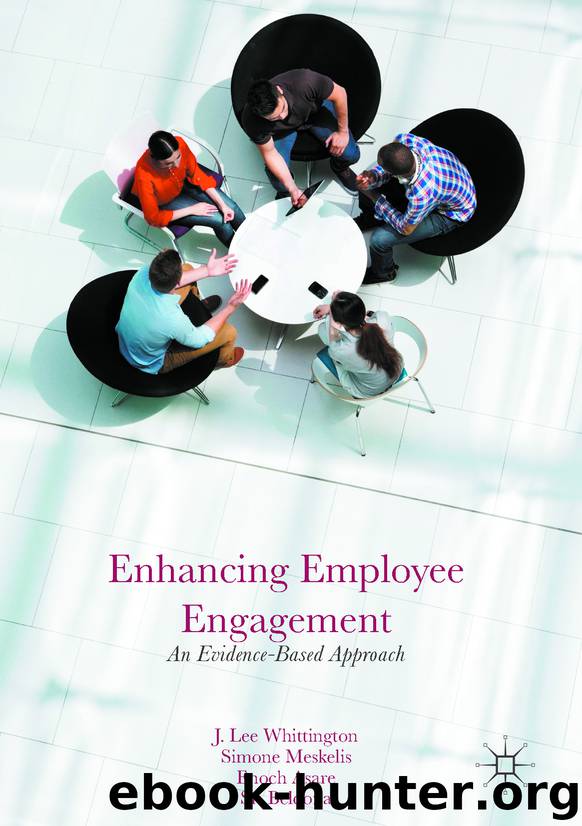Enhancing Employee Engagement by J. Lee Whittington Simone Meskelis Enoch Asare & Sri Beldona

Author:J. Lee Whittington, Simone Meskelis, Enoch Asare & Sri Beldona
Language: eng
Format: epub
Publisher: Springer International Publishing, Cham
Meaningfulness
–
–
–
0.5338
0.0325
0.0000
–
–
–
MRS
0.2459
0.0374
0.0000
0.0492
0.0263
0.0615
0.1805
0.0320
0.0000
Integrated Faith of Non-Christians
The investigation of the connection between spirituality and the experience of meaningfulness presented in this chapter is based on a biblical view of integrated faith. The measure we used was originally designed to assess the maturity and integration of a Christian’s faith. While not intentional, the samples we obtained in our field studies were heavily skewed toward those who professed to be Christians. Therefore, generalizing our results to people of other faith traditions or spiritual orientations should be done with caution. In spite of these limitations, we conducted a variety of post-hoc analyses to investigate the faith–meaningfulness connection in those who identified themselves with other faiths. These analyses are described in the next section.
In their original conception of the MRS, Pieper, Van Uden, and De Vries-Schot (2012) explicitly stated that their scale was designed to assess the maturity of a Christian’s faith. Although the majority of participants in our study indicated an affiliation with the Christian faith, our first sample included people from many faith traditions. In this sample we found consistently strong reliability across the religious affiliations.
However, we were curious to see if there were any differences on the measure of MRS between the different faith traditions. In order to examine this, we did a t-test to see if there was a significant difference between individuals who reported themselves as Christians (n = 109) and those who identified themselves as Muslims (n = 18) and Hindus (n = 16). Because of the extremely small number of non-Christians in this sample, these results should be interpreted with a great deal of caution. However, there are some interesting results. Muslims reported the highest mean level of MRS, followed by Christians. There is a significant difference in the level of MRS reported by Christians (4.15) and non-Christians (3.97); however, the mean level of MRS for Christians (4.15) and Muslims (4.25) was not significantly different. There was a significant difference between Christians (4.15) and Hindus (3.65). There was also a significant difference between Muslims (4.25) and Hindus (3.65).
Download
This site does not store any files on its server. We only index and link to content provided by other sites. Please contact the content providers to delete copyright contents if any and email us, we'll remove relevant links or contents immediately.
Bad Blood by John Carreyrou(6601)
Rich Dad Poor Dad by Robert T. Kiyosaki(6578)
Principles: Life and Work by Ray Dalio(6384)
Playing to Win_ How Strategy Really Works by A.G. Lafley & Roger L. Martin(6187)
Management Strategies for the Cloud Revolution: How Cloud Computing Is Transforming Business and Why You Can't Afford to Be Left Behind by Charles Babcock(4560)
The Confidence Code by Katty Kay(4237)
Thinking in Bets by Annie Duke(4205)
American Kingpin by Nick Bilton(3858)
Delivering Happiness by Tony Hsieh(3408)
Project Animal Farm: An Accidental Journey into the Secret World of Farming and the Truth About Our Food by Sonia Faruqi(3207)
The Power of Habit by Charles Duhigg(3116)
The Tyranny of Metrics by Jerry Z. Muller(3050)
Brotopia by Emily Chang(3039)
Mastering Bitcoin: Programming the Open Blockchain by Andreas M. Antonopoulos(3029)
The Marketing Plan Handbook: Develop Big-Picture Marketing Plans for Pennies on the Dollar by Robert W. Bly(3027)
I Live in the Future & Here's How It Works by Nick Bilton(2975)
The Content Trap by Bharat Anand(2910)
Building a StoryBrand by Donald Miller(2883)
Applied Empathy by Michael Ventura(2882)
